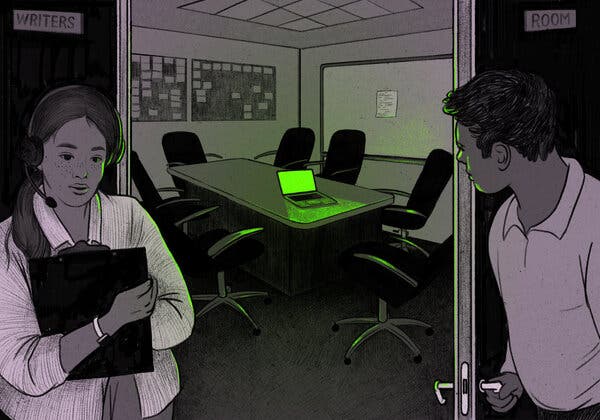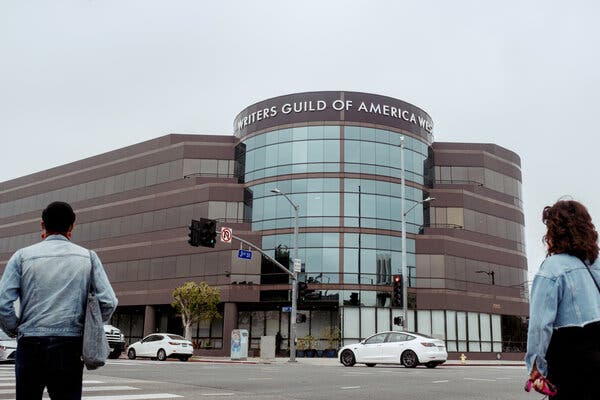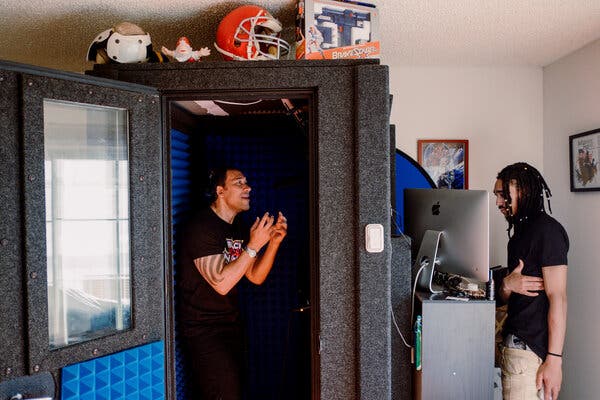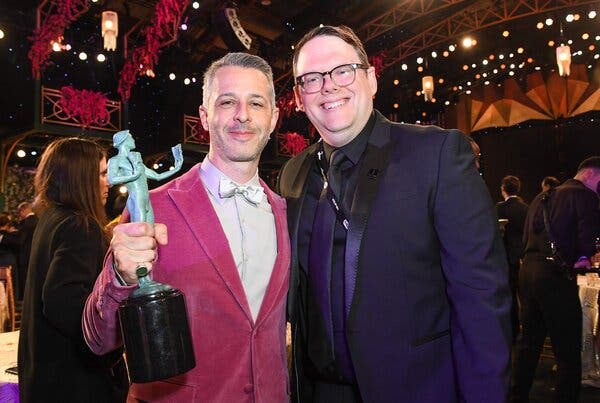Naturally the alarmist in me focused on the more obvious existential dangers.
However the most immediately relevant AI dangers are the ones unfolding as we speak.
I only just heard that the Writer’s Guild in the US is already having to wrestle with the AI cuckoo muscling in on in the nest.
Just as for real cuckoos, the only way to deal with them is early action.
NYT below article covers it - I think.
ED
Will a Chatbot Write the Next ‘Succession’?
As labor contract negotiations heat up in Hollywood, unions representing writers and actors seek limits on artificial intelligence.
Credit…Julia Kuo

Koblin")](John Koblin - The New York Times)
By Noam Scheiber and John Koblin
Noam Scheiber is a labor reporter, and John Koblin covers the television industry.
April 29, 2023
When the union representing Hollywood writers laid out its list of objectives for contract negotiations with studios this spring, it included familiar language on compensation, which the writers say has either stagnated or dropped amid an explosion of new shows.
But far down, the document added a distinctly 2023 twist. Under a section titled “Professional Standards and Protection in the Employment of Writers,” the union wrote that it aimed to “regulate use of material produced using artificial intelligence or similar technologies.”
To the mix of computer programmers, marketing copywriters, travel advisers, lawyers and comic illustrators suddenly alarmed by the rising prowess of generative A.I., one can now add screenwriters.
“It is not out of the realm of possibility that before 2026, which is the next time we will negotiate with these companies, they might just go, ‘you know what, we’re good,’” said Mike Schur, the creator of “The Good Place” and co-creator of “Parks and Recreation.”
“We don’t need you,” he imagines hearing from the other side. “We have a bunch of A.I.s that are creating a bunch of entertainment that people are kind of OK with.”
In their attempts to push back, the writers have what a lot of other white-collar workers don’t: a labor union.
Mr. Schur, who serves on the bargaining committee of the Writers Guild of America as it seeks to avert a strike before its contract expires on Monday, said the union hopes to “draw a line in the sand right now and say, ‘Writers are human beings.’”
But unions, historians say, have generally failed to rein in new technologies that enable automation or the replacement of skilled labor with less-skilled labor. “I’m at a loss to think of a union that managed to be plucky and make a go of it,” said Jason Resnikoff, an assistant professor of history at the University of Groningen in the Netherlands, who studies labor and automation.
Image
The Writers Guild wants to ensure that artificial intelligence does not receive a writer’s credit on a project.Credit…Mark Abramson for The New York Times

The fortunes of the writers, actors and directors negotiating new contracts this year may say a lot about whether the pattern will continue into the era of artificial intelligence.
In December, Apple introduced a service allowing book publishers to use human-sounding A.I. narrators, an innovation that could displace hundreds of voice actors who make a living performing audiobooks. The company’s website says the service will benefit independent authors and small publishers.
A New Generation of Chatbots
Card 1 of 5
A brave new world. A new crop of chatbots powered by artificial intelligence has ignited a scramble to determine whether the technology could upend the economics of the internet, turning today’s powerhouses into has-beens and creating the industry’s next giants. Here are the bots to know:
ChatGPT. ChatGPT, the artificial intelligence language model from a research lab, OpenAI, has been making headlines since November for its ability to respond to complex questions, write poetry, generate code, plan vacations and translate languages. GPT-4, the latest version introduced in mid-March, can even respond to images (and ace the Uniform Bar Exam).
Bing. Two months after ChatGPT’s debut, Microsoft, OpenAI’s primary investor and partner, added a similar chatbot, capable of having open-ended text conversations on virtually any topic, to its Bing internet search engine. But it was the bot’s occasionally inaccurate, misleading and weird responses that drew much of the attention after its release.
Bard. Google’s chatbot, called Bard, was released in March to a limited number of users in the United States and Britain. Originally conceived as a creative tool designed to draft emails and poems, it can generate ideas, write blog posts and answer questions with facts or opinions.
Ernie. The search giant Baidu unveiled China’s first major rival to ChatGPT in March. The debut of Ernie, short for Enhanced Representation through Knowledge Integration, turned out to be a flop after a promised “live” demonstration of the bot was revealed to have been recorded.
“I know someone always has to get there first, some company,” said Chris Ciulla, who estimates that he has made $100,000 to $130,000 annually over the past five years narrating books under union contracts. “But for individuals not to understand how that can affect the pail-carrying narrator out there eventually is disappointing.”
Other actors fear that studios will use A.I. to replicate their voices while cutting them out of the process. “We’ve seen this happening — there are websites that have popped up with databases of characters’ voices from video games and animation,” said Linsay Rousseau, an actress who makes her living doing voice work.
On-camera actors point out that studios already use motion capture or performance capture to replicate artists’ movements or facial expressions. The 2018 blockbuster “Black Panther” relied on this technology for scenes that depicted hundreds of tribespeople on cliffs, mimicking the movements of dancers hired to perform for the film.
Some actors worry that newer versions of the technology will allow studios to effectively steal their movements, “creating new performance in the style of a wushu master or karate master and using that person’s style without consent,” said Zeke Alton, a voice and screen actor who sits on the board of his union local, SAG-AFTRA, in Los Angeles.
Image

Zeke Alton, a voice and screen actor who sits on the board of the SAG-AFTRA local in Los Angeles, in his soundproof studio booth at home.Credit…Mark Abramson for The New York Times
And Hollywood writers have grown increasingly anxious as ChatGPT has become adept at mimicking the style of prolific authors.
“Early on in the conversations with the guild, we talked about what I call the Nora Ephron problem,” said John August, who is on the Writers Guild negotiating committee. “Which is basically: What happens if you feed all of Nora Ephron’s scripts into a system and generate an A.I. that can create a Nora Ephron-sounding script?”
Mr. August, a screenwriter for movies like “Charlie’s Angels” and “Charlie and the Chocolate Factory,” said that while artificial intelligence had taken a back seat to compensation in the Writers Guild negotiation, the union was making two key demands on the subject of automation.
It wants to ensure that no literary material — scripts, treatments, outlines or even discrete scenes — can be written or rewritten by chatbots. “A terrible case of like, ‘Oh, I read through your scripts, I didn’t like the scene, so I had ChatGPT rewrite the scene’ — that’s the nightmare scenario,” Mr. August said.
The guild also wants to ensure that studios can’t use chatbots to generate source material that is adapted to the screen by humans, the way they might adapt a novel or a magazine story.
SAG-AFTRA, the actors’ union, says more of its members are flagging contracts for individual jobs in which studios appear to claim the right to use their voices to generate new performances.
A recent Netflix contract sought to grant the company free use of a simulation of an actor’s voice “by all technologies and processes now known or hereafter developed, throughout the universe and in perpetuity.”
Netflix said the language had been in place for several years and allowed the company to make the voice of one actor sound more like the voice of another in case of a casting change between seasons of an animated production.
The union has said that its members are not bound by contract provisions that would allow a producer to simulate new performances without compensating actors, though it has sometimes intervened to strike them from contracts nonetheless.
Image

Duncan Crabtree-Ireland, right, with the actor Jeremy Strong. “If you look at culture in general, the audience is generally interested in the real lives of our members,” Mr. Crabtree-Ireland said. “A.I. is not in a position to substitute for key elements of that.”Credit…Valerie Macon/Agence France-Presse — Getty Images
Duncan Crabtree-Ireland, SAG-AFTRA’s executive director, said such contracts posed a much bigger risk to nonunion actors, who can become unwitting accomplices in their own obsolescence. “It only takes one or a few instances of signing away your rights on a lifetime basis to really potentially have a negative impact on your career prospects,” Mr. Crabtree-Ireland said.
The Alliance of Motion Picture and Television Producers, which bargains with the various unions that represent writers, actors and directors on behalf of the major Hollywood studios, declined to comment.
When professionals have fended off obsolescence at the hands of technology, the outcome has often reflected their occupation’s status and prestige.
That appears to have been the case to some extent with airplane pilots, whose crew sizes had dropped to two on most domestic commercial flights by the late 1990s, but have largely been level since then, even as automated technology has become far more sophisticated and the industry has explored further reductions.
“The safety net you have when you’re high off the ground — the one that keeps you from hitting the ground — is two highly trained, experienced, rested pilots,” said Capt. Dennis Tajer, a spokesman for the Allied Pilots Association, which represents pilots for American Airlines. To this day, flight times longer than nine hours require at least three pilots.
The replacement of certain doctors by artificial intelligence, which some experts predicted was imminent in fields like radiology, has also failed to materialize. That’s partly because of the limits of the technology, and because of the stature of the doctors, who have inserted themselves into high-stakes conversations about the safety and deployment of A.I. The American College of Radiology created a Data Science Institute partly for this purpose several years ago.
Whether screenwriters find similar success will depend at least in part on if there are inherent limits to the machines that purport to do their jobs. Some writers and actors speak of a so-called uncanny valley that algorithms may never entirely escape.
“Artists look at everything ever created and find a flash of newness,” said Javier Grillo-Marxuach, a writer and producer for “Lost” and “Dark Crystal: Age of Resistance.” “What the machine is doing is recombining.”
However sophisticated the algorithms, the fate of writers and actors will also depend on how well they protect their status. How good are they at convincing audiences that they should care whether a human is involved?
The unions are pressing their case. Mr. August says that it falls to the Writers Guild and not the studio to determine who receives a writer’s credit on a project, and that the union will guard this rite jealously. “We want to make sure that an A.I. is never one of those writers in the chain of title for a project,” he said.
The unions also have legal cards to play, Mr. Crabtree-Ireland of SAG-AFTRA said, like the U.S. Copyright Office’s pronouncement in March that content created entirely by algorithm is not eligible for copyright protection. It is harder to monetize a production if there is no legal obstacle to copying it.
Perhaps more important, he said, is what you might call the Us Weekly factor — the tendency of audiences to be as interested in the human behind the role as in the performance. Fans want to hear Hollywood celebrities discuss their method in interviews. They want to gawk at actors’ fashion sensibilities and keep up with whom they’re dating.
“If you look at culture in general, the audience is generally interested in the real lives of our members,” Mr. Crabtree-Ireland said. “A.I. is not in a position to substitute for key elements of that.”





